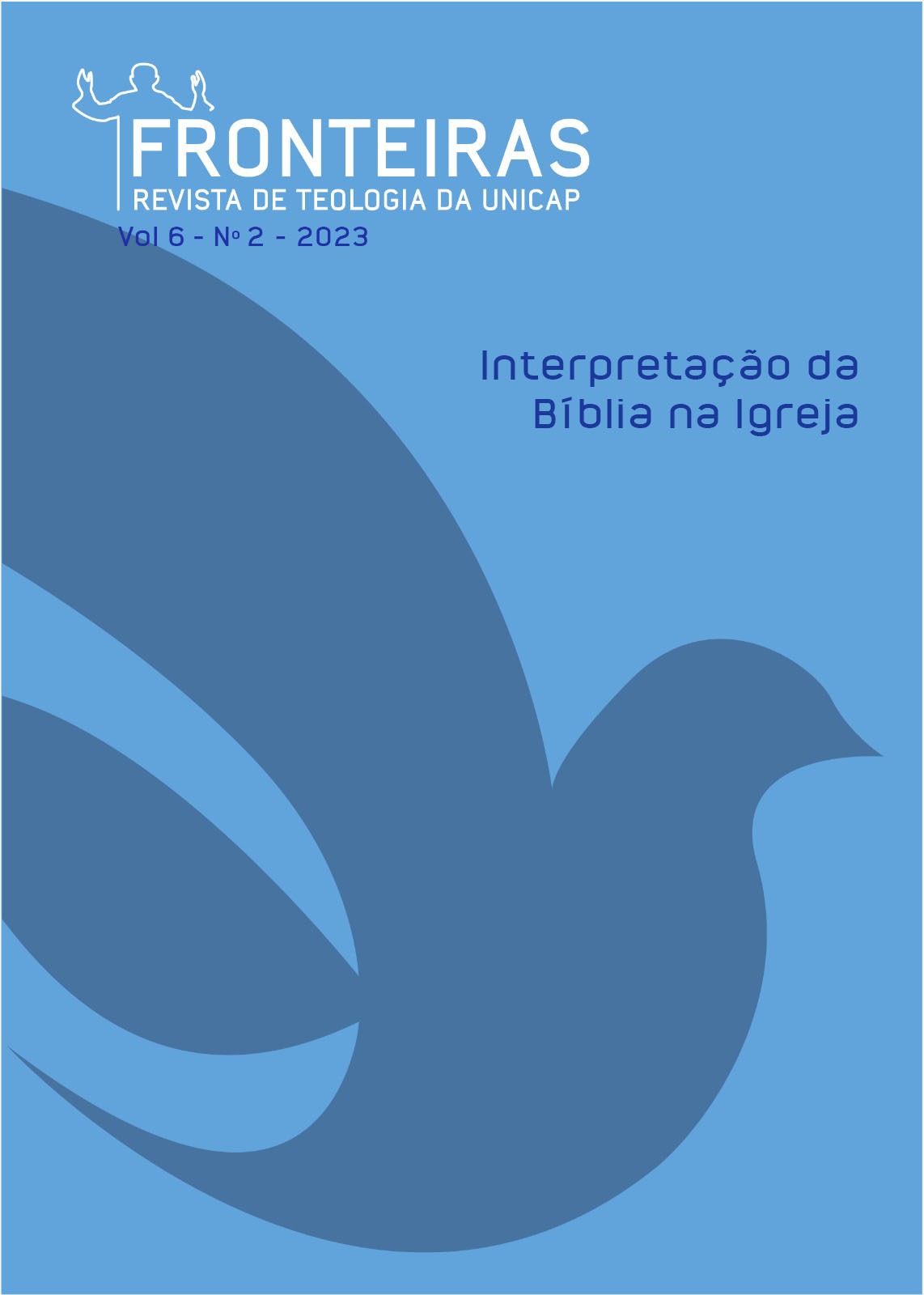Fish in the Ecotheological Reflection of the Hebrew Bible
DOI:
https://doi.org/10.25247/2595-3788.2023.v6n2.p214-227Keywords:
Fish, Hebrew Bible, Ecotheology, Environment, SocietyAbstract
The millennial texts that form the Hebrew Bible bring with them a significant reflection on non-human beings, that is, abiotic beings, plants, and animals. Thus, an ecotheology is born that discovers nature as the word of God and sees the human being amid other creatures. Moreover, it indicates the urgency of respectful coexistence and the ethics of care and/or stewardship since all beings are residents of a common home. In the present study, the Hebrew Bible is visited in search of the thirty-four presences of the word commonly translated as "fish", knowing that there are no mentions of species of this aquatic animal. The aim is to bring together the elements that, present in different literary-historical contexts, establish an ecotheological reflection. Thus, the research proposed here is part of the green reading of biblical texts. Thirty years ago, at the time of the publication of the ecclesial document “The Interpretation of the Bible in the Church”, this theme had not yet gained greater visibility. Today, however, it is urgent.
Downloads
References
BAUMGART, Norbert Clemens. Die Umkehr des Schöpfergottes. Zu Komposition und religionsgeschichtlichem Hintergrund von Gen 5–9. Freiburg: Herder, 1999.
BERGES, Ulrich. Jesaja 49–54. Freiburg: Herder, 2015.
FISCHER, Georg. Genesis 1–11. Freiburg: Herder, 2018.
FISCHER, Georg; MARKL, Dominik. Das Buch Exodus. Stuttgart: Katholisches Bibelwerk, 2009.
FRANCISCO, Papa. Carta Encíclica Laudato Si’ sobre o cuidado da casa comum. São Paulo: Paulinas, 2015.
FRETHEIM, Terence E. Genesis and Ecology. In: EVANS, Craig A.; LOHR, Joel N.; PETERSEN, David L. The Book of Genesis. Composition, Reception, and Interpretation. Leiden: Brill, 2012, p. 683-706.
GREENBERG, Moshe. Ezechiel 21–37. Freiburg: Herder, 2005.
GRENZER, Matthias; GROSS, Fernando. Leis deuteronômicas favoráveis à preservação de fauna e flora. Pistis & Praxis (Curitiba), v. 11, p. 778-791, 2019.
GRENZER, Matthias. Erva, bovino selvagem, tamareira e cedro. Ecoespiritualidade no Salmo 92. Atualidade Teológica (Rio de Janeiro), v. 24, p. 66-86.
GRENZER, Matthias; RAMOS, Marivan Soares. Água nos Salmos. Elementos para uma ecoespiritualidade. Revista Eclesiástica Brasileira (Petrópolis), v. 80, p. 750-763, 2020.
GRENZER, Matthias; AGOSTINHO, Leonardo Henrique Silva. Árvores nos Salmos. Elementos para uma educação espiritual e ambiental. Encontros Teológicos (Florianópolis), v. 36, p. 439-456, 2021.
GRENZER, Matthias. Econarratividades exodais: A praga das rãs em Ex 7,26–8,11. In: GUIMARÃES, Edward; SBARDELOTTI, Emerson; BARROS, Marcelo. (Org.). 50 anos de Teologia da Libertação. Memória, revisão, perspectivas e desafios. São Paulo: Recriar, 2022, p. 129-142.
GRENZER, Matthias; BARROS, Paulo Freitas; DANTAS, José Ancelmo Santos. Pássaros nos Salmos. Elementos para uma ecoespiritualidade. Revista Eclesiástica Brasileira (Petrópolis), v. 82, p. 115-129, 2022.
GRENZER, Matthias. Aprendizados com a catástrofe climática (Ex 9,13-35). Perspectiva Teológica (Belo Horizonte), v. 54, p. 375-391, 2022.
GRENZER, Matthias. A morte do gado (Ex 9,1-7). Revista de Interpretação Bíblica Latino-Americana (São Bernardo), v. 89, p. 80-92, 2023.
GRENZER, Matthias; DANTAS, José Ancelmo Santos; BARROS, Paulo Freitas. A bondade de Deus no templo e na natureza. Leitura verde do Salmo 65. Encontros Teológicos (Florianópolis), v. 38, p. 171-196, 2023.
GRENZER, Matthias. Fuligem. Econarratividades em Ex 9,8-12. Cadernos de Sion (São Paulo), v. 4, p. 8-18, 2023.
GRENZER, Matthias; FERNANDES, Leonardo Agostini. Gafanhotos na Bíblia Hebraica: suas dimensões socioambientais e teológicas. Revista de Cultura Teológica (São Paulo), v. 31, p. 115-130, 2023.
HIEKE, Thomas. Levitikus 1–15. Freiburg: Herder, 2014.
IRSIGLER, Hubert. Zefanja. Freiburg: Herder, 2002.
LOHFINK, Norbert. Die Gottesstatue: Kreatur und Kunst nach Genesis 1. In: LOHFINK, Norbert. Im Schatten deiner Flügel: Grosse Bibeltexte neu ersclossen. Freiburg: Herder, 1999.
NERIL, Yonatan; DEE, Leo. Eco Bible. Volume 1: An Ecological Commentary on Genesis and Exodus. Jerusalem: The Interfaith Center for Sustainable Development, 2020.
NERIL, Yonatan; DEE, Leo. Eco Bible. Volume 2: An Ecological Commentary on Leviticus, Numbers, and Deuteronomy. Jerusalem: The Interfaith Center for Sustainable Development, 2020.
NEUMANN-GORSOLKE, Ute. “In eure Hand sind sie gegeben …” (Gen 9,2). Tiertötung im Alten Testament. In: JOACHIMIDES, Alexis; MILLING, Stephanie; MÜLLNER, Ilse; THÖNE, Yvonne Sophie. Opfer – Beute – Hauptgericht. Tiertötungen im interdisziplinären Diskurs. Bielefeld: Transcript, 2016, p. 47-67.
ZANGENBERG, Jürgen K. Fishing. In: BERLEJUNG, Angelika (ed.). Encyclopedia of Material Culture in the Biblical World. A New Biblisches Reallexikon. Tübingen: Mohr Siebeck, 2022, p. 269-279.
Downloads
Published
Issue
Section
License
Copyright (c) 2023 Matthias Grenzer, Fernando Gross

This work is licensed under a Creative Commons Attribution 4.0 International License.
Autores que publicam nesta revista concordam com os seguintes termos:
- Autores mantém os direitos autorais e concedem à Fronteiras - Revista de Teologia da Unicap o direito de primeira publicação, com o trabalho simultaneamente licenciado sob a Licença Creative Commons Attribution que permite o compartilhamento do trabalho com reconhecimento da autoria e publicação inicial nesta Revista.
- Autores têm autorização para assumir contratos adicionais separadamente, para distribuição não-exclusiva da versão do trabalho publicada nesta revista (ex.: publicar em repositório institucional ou como capítulo de livro), desde que reconheça e indique a autoria e a publicação inicial nesta Revista.
- Autores têm permissão e são estimulados a publicar e distribuir seu trabalho online (ex.: em repositórios institucionais ou na sua página pessoal) a qualquer momento depois da conclusão de todo processo editorial, já que isso pode gerar alterações produtivas, bem como aumentar o impacto e a citação do trabalho publicado (Veja O Efeito do Acesso Livre).






















